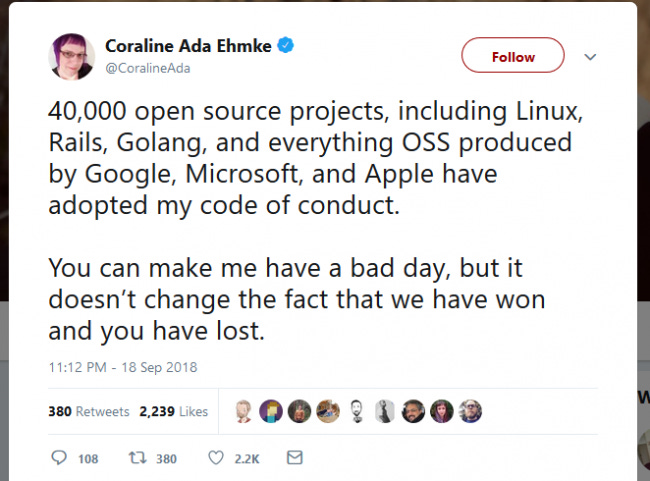Weekly Roundup: Harrison Bergeron, In Software! Edition
When I was a child, I read Harrison Bergeron and took it for what it was meant to be: a fable, an allegory, a warning. Never, not for a solitary moment, did I think that it was an instruction manual.
"Coraline Ada Ehmke", a scripting-language "programmer" who spends most of xir time trying to promote "social justice" instead of, say, learning to program in an actual programming langugage, is in the news lately for basically hounding Linus Torvalds out of Linux. This is the equivalent of running Steve Harris out of Iron Maiden, or getting everybody but Ringo to quit the Beatles.
But wait, there's more. "Coraline" has also come up with an absolutely fabulous idea, one that would have shocked Kurt Vonnegut at his most cynical and disaffected: the end of meritocracy.
It's called The Post-Meritocracy Manifesto:
Meritocracy is a founding principle of the open source movement, and the ideal of meritocracy is perpetuated throughout our field in the way people are recruited, hired, retained, promoted, and valued. . But meritocracy has consistently shown itself to mainly benefit those with privilege, to the exclusion of underrepresented people in technology. The idea of merit is in fact never clearly defined; rather, it seems to be a form of recognition, an acknowledgement that “this person is valuable insofar as they are like me.”
Compare that to Vonnegut's story:
He tried to think a little about the ballerinas. They weren't really very good-no better than anybody else would have been, anyway. They were burdened with sashweights and bags of birdshot, and their faces were masked, so that no one, seeing a free and graceful gesture or a pretty face, would feel like something the cat drug in. George was toying with the vague notion that maybe dancers shouldn't be handicapped. But he didn't get very far with it before another noise in his ear radio scattered his thoughts.
Since this exceptionally stupid person appears unable to grasp what "merit" might be in tech, allow me to enlighten it. "Merit" is the combination of talent and effort. It's writing "River Raid" for the Atari 2600 in a memory space that wouldn't hold this plaintext column. It's developing the C language or UNIX. It's writing the Linux kernel. It is the thousands of extraordinary achievements that have made everything from the cathode-ray-tube terminal to machine-learning pattern recognition possible. It is the relational database, and it is also (to my annoyance) the NoSQL database. It is optimization, it is debugging, it is flawless delivery. It is meeting the spec on time.
It doesn't matter if you're black, white, pink, male, female, furry, or whatever Coraline thinks it is at the moment. Meritocracy cares not. Neither does the tech biz. Tech does not have a diversity problem, unless you count the virtual erasure of American citizens from the rank-and-file in Silicon Valley and elsewhere thanks to low-cost wage subversions like H1-B. Walk around the campus at Google or Facebook and see the tsunami of brown, yellow, and (occasionally) white faces. The days of tech being a club for white men with a 130-and-up IQ disappeared around the time that we stopped requiring that code be performance-optimized enough for low-performance processors and bug-free enough to burn onto permanent storage media. (Make of that what you will.) Today it's "diverse" in the modern sense of "Irish (and Germans, and Brits, and French) need not apply."
In short, "meritocracy", whatever feebly vestigial tail of it still exists in tech, does not need to be dismantled. In fact, we could use some more of it. Which hasn't stopped Coraline from declaring victory, with some justification. We now live in the post-meritocracy era:
It is time that we as an industry abandon the notion that merit is something that can be measured, can be pursued on equal terms by every individual, and can ever be distributed fairly. . What does a post-meritocracy world look like? It is founded on a core set of values and principles, an affirmation of belonging that applies to everyone who engages in the practice of software development.
You no longer need to be any good at something in order to demand a career in that thing. Good to know. I'm ready to be an NBA center, or a surfer, or an astronaut. Put me in, coach, I'm ready to play! Let's stop measuring people! Let's stop expecting them to do anything of value! Luckily for us, nobody will ever take this person seriously...

You know, the more I think about it the more I think I'm just about ready to welcome our new Chinese overlords. We might not have safe bridges or drywall-dust-free baby formula, but they will put a stop to this bullshit with an iron fist. Goodbye Google, hello Baidu! To quote another dystopian future that appears ever-closer to reality... I finally learned to love Big Brother!
* * *
This week I wrote about a great engine in need of a great home and cars that rang the cash register but dug the graves of their manufacturers.

